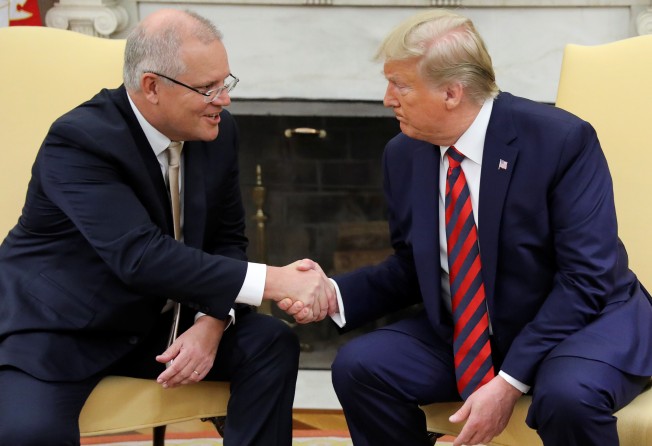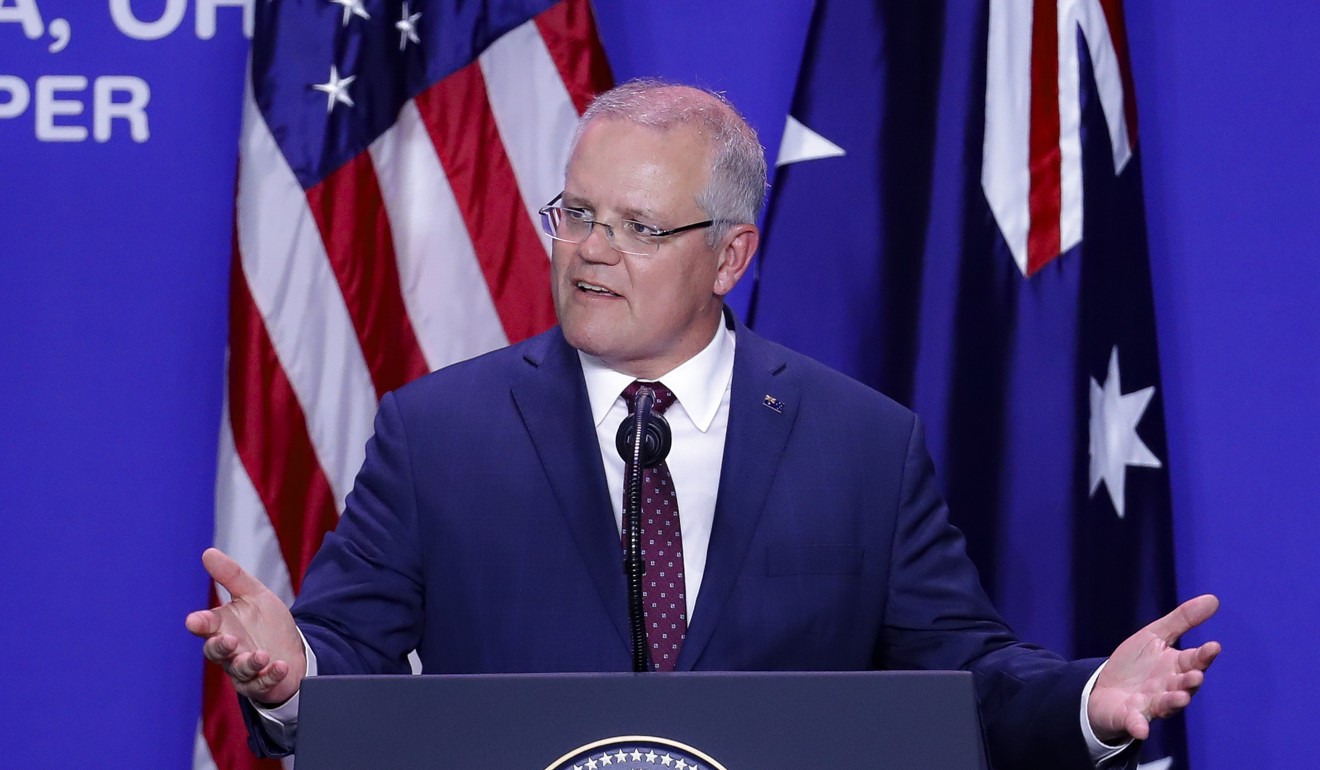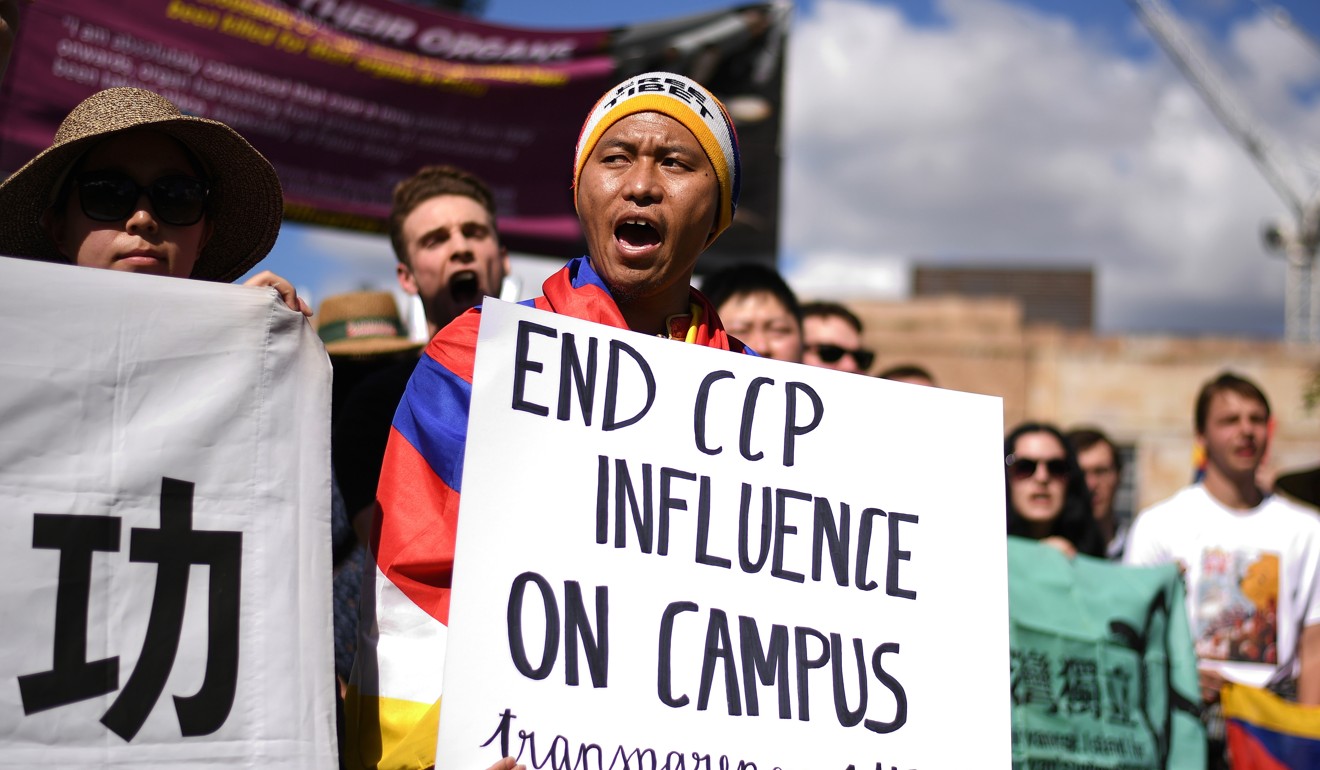Australian PM plays down pivot to US, as Chinese academics push Beijing’s line in Australia
- Australian PM Scott Morrison has denied toeing Donald Trump’s line on China, as he wrapped up a six-day visit to the US
- This comes as three Chinese academics pushed Beijing’s line during an academic roadshow to Australia organised by the Chinese embassy

Australian Prime Minister Scott Morrison has denied toeing Donald Trump’s line on Beijing, days after backing the US president’s stance that China should no longer be treated as a developing country under international trade rules.
“Australia’s view is based on our national interest on all of these things and that’s what guides our own comments, our own discussions,” Morrison told reporters in New York on Thursday as he wrapped up a six-day visit to the United States.
In a veiled reference to Australia’s balancing act between its security ally Washington and main trading partner Beijing, Morrison also warned against adopting a fatalistic view of a “polarised world where countries feel pushed to make binary choices”.
“Australia will continue to resist this path,” he said. “Australia will continue to seek to honestly maintain our great alliances and comprehensive partnerships in good repair, from our great and powerful friends to our smallest Pacific Island family neighbours.”
Morrison’s remarks came after he said on Tuesday that China should be subject to new rules and obligations as a “newly developed economy”, and last week prefaced a rare state dinner with Trump by insisting that China should not have “special rules”.
The Global Times, a pro-government newspaper, hit back in an editorial on Wednesday, accusing Western countries of defining China’s economic development based on “selfish considerations”.
Under World Trade Organisation rules, China’s self-identification as a “developing country” grants it greater access to subsidies and more time to implement its obligations to ease trade barriers – a situation Trump has blasted as unfair given the country’s development and size.
The Australian leader’s effort to play down suggestions of a pivot toward Washington came as a trio of Chinese academics wrapped up a three-day tour of Australia organised by the Chinese embassy in Canberra. They gave interviews with local media and visited think tanks in Sydney and Canberra including the Lowy Institute, the Australian Institute of International Affairs and the Australian Strategic Policy Institute.

Wang Yiwei, an international relations professor at Renmin University in Beijing, on Wednesday warned that Australia could not rely on the US to defend it if tensions between Washington and Beijing escalated to the point of war.
“We want a good relationship with everyone. Australia should be the bridge, to bridge the gap between China and the United States,” Wang told local media.
Wang also took aim at Australia’s ban on Huawei’s involvement in its 5G network and the introduction of anti-foreign interference laws last year, while accusing Canberra of trying to “embarrass” China by orchestrating the UN’s recent criticism of the treatment of the Uygur minority in Xinjiang.
Hong Chen, director of the Australian Studies Centre at the East China Normal University in Shanghai, said the purpose of the tour, which also included Chongyang Institute for Financial Studies director Chen Xiaochen, was to “exchange ideas and opinions, in particular for us to learn what our Australian colleagues think about China and Australia-China relations”.
Nathan Attrill, a PhD candidate studying Chinese politics at Australian National University’s Crawford School in Canberra, said the tour represented an evolution in Beijing’s efforts to spread its message abroad.
“This ‘academic roadshow’ would appear to be a very different PR tactic than what has previously occurred as part of the debate about the evolving relationship between the two countries,” Attrill said.

“Australians would be more used to hearing from a Chinese government spokesperson what Canberra is doing wrong than directly from a Chinese professor.
“It is savvy in the sense that an academic like Professor Wang Yiwei could be perceived as a more objective and non-political voice than a spokesperson from the Chinese embassy,” Attrill said. “Australians may not be aware about the tremendous pressures many Chinese academics face to promote a positive image of China to the outside world and uphold the official government line, whether they agree with it or not.”
But Kevin Carrico, a senior lecturer in Chinese studies at Monash University in Melbourne, described the comments made by the academics as “tone-deaf”, while Mobo Gao, a Chinese-born social science professor at the University of Adelaide, cast doubt on whether Australians would be persuaded by the viewpoints they put forth.
Said Carrico: “Wang Yiwei, for example, is basically engaging in threats. This may be how PRC officials speak to their subjects, but it is not an appealing approach to international relations.”